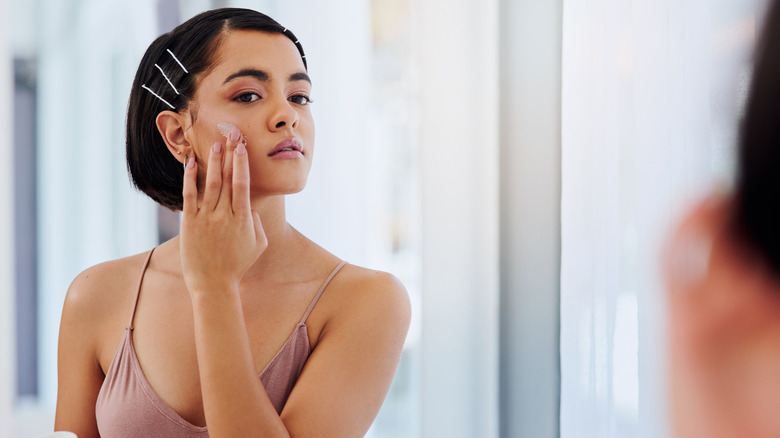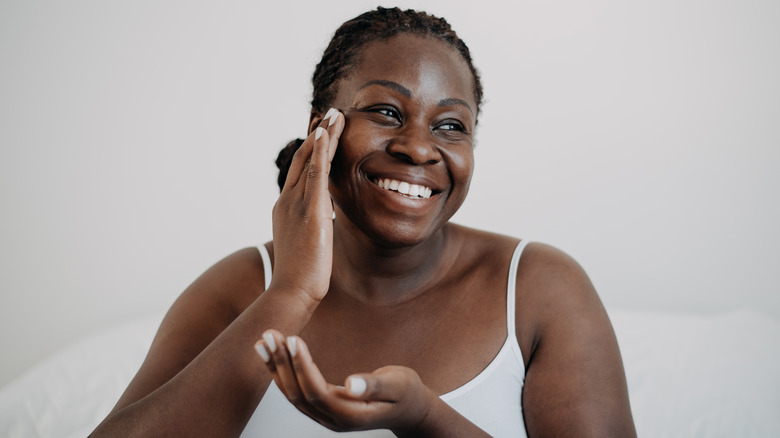Never Forget This Critical Step When Applying Makeup
Between foundations, stains, and powder, putting on makeup can feel like a science experiment. This feeling can be compounded when you factor in the potential for breakouts and dryness that can necessitate even more layers of makeup. While you might already feel like you're layering too much on, did you know you might be missing a critical layer of your beauty routine? It might seem like it would only cause more problems, but including moisturizer before your makeup routine can actually be a game changer — not only for your skin health, but also the finished appearance of your makeup.
Board-certified dermatologist, Lian Mack, M.D., explained to Real Simple, "The skin barrier is the very outermost part of the epidermal layer that protects our bodies from environmental insults and enables the skin to hold on to moisture which prevents inflammatory skin conditions like atopic dermatitis." This means that putting a moisturizing layer between your skin and your makeup can better protect your skin from any irritants that might be in your makeup formula. Plus, depending on your skin type, certain moisturizer types can help to create a smoother finish with your foundation than others. Having the right moisturizer (remember that hydrating and moisturizing are two different things) can be especially important for those with chronic skin conditions like dryness or even eczema.
Why moisturizer is important
Marisa Garshick, M.D., a board-certified dermatologist, explained to Real Simple, "Moisturizers are designed to hydrate the skin and support the skin barrier while also working to soften and smooth the skin. Moisturizers use key ingredients such as humectants to draw moisture in, emollients to soften and smooth the skin, and occlusives to lock moisture in." If you're not sure what emollients, humectants, or occlusives are, we have a guide that can help. Depending on your skin type and moisturizing goals, any of the three could be beneficial as part of your regular beauty routine.
You might not realize this, but your skin is almost constantly losing moisture. Transepidermal water loss is a measurement used to determine the amount of moisture lost. Scientifically, this measurement helps to determine skin water barrier integrity. Simplified, it's a way to know if your skin barrier is healthy, and is the primary reason that moisturizing is so important. In addition to losing moisture, your skin also loses naturally occurring oils whenever you shower or wash your face. So, ensuring you replenish any lost moisture can help keep your skin barrier in tip-top shape. Another important reason to factor a moisturizer into your beauty routine is makeup ingredients. Many makeup products contain alcohol, dyes, and other ingredients that can dry out your skin. Plus, the weather, your perspiration levels, and sensitivity to these ingredients can cause blemishes, acne, and even infections.
What kind of moisturizer is best
Your individual skin type dramatically impacts which kind of moisturizer will work best for you. If you're someone with oily and/or acne-prone skin, sticking to non-comedogenic products is a must. Products that are non-comedogenic are specially formulated to help prevent clogged pores. Plus, they tend to be lighter-weight and water-based, which is great for those already dealing with extra oil.
On the other hand, if you are someone with dry skin, heavier moisturizers can be a necessity. People with dry skin can benefit from looking for moisturizers that contain all three kinds of moisturizing elements (humectants, emollients, and occlusives) but might find the most success with occlusives specifically. Looking for thick and creamy products with nourishing ingredients like shea butter or jojoba oil can mean the difference between dry, cracked skin and supple smoothness.
Sensitive skin can be trickier when it comes to moisturizers, but a good rule of thumb is to avoid fragrances that might irritate your skin. Finding ingredients that can help to boost your skin barrier (ceramides and/or peptides) can be beneficial in helping keep your skin moisturized and better protected from irritants. As we head into the colder months, it's also important to remember that your skin care needs will change. Board-certified dermatologist Jeanette Graf, M.D., explained to Real Simple, "During the cold, winter months, your skin may need a richer moisturizer than during the warmer months."


